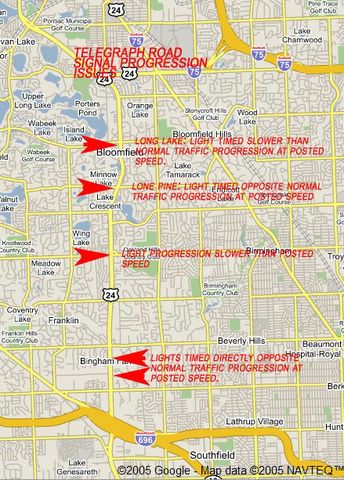Bragging about your accomplishments may not always be the best practice.
The next time you are caught in a long sequence of poorly timed lights along a main road in Oakland County, you can thank this company who takes great pride in what they have accomplished.
Ironically, one of their boasts struck a real chord with me when I read it today:
- Provide timing charts required by the agencies with traffic signal maintenance responsibilities, namely RCOC, Pontiac, Royal Oak and Ferndale.
- Provide a detailed network signal progression plan with optimized traffic signal operations for at least three periods for over 300 intersections.
- Conduct a follow-up critique of the network and recommend adjustments to the system as required.
- Provide a smoother commute with better synchronization of red lights.
Why was is so ironic? Because a few days ago,
prior to reading these boasts, I sent the heads of this company a communication which included the following under the heading of "
What's Lacking":
- central authority - travel from one city/town to another and signal progression is uncoordinated or arbitrarily different; e.g., Van Dyke traveling from Warren to Royal Oak;
- central strategy - a variety of approaches in a variety of situations leave drivers hopelessly confused about why lights on a main artery turn red for a light at an intersection where there is no possible cross traffic (e.g. South Ave in Pontiac between MLK Blvd and Centerpoint Pkwy in the evening when all of the GM facilities are closed). Some cities have systems that turn such intersections to flashing yellow, while others have the intersections stay green for the main route and change only when traffic arrives from the side street, while others ignore the problem entirely (Pontiac).
Well, now. It seems that either the advice that was given was really, really faulty... or the cities of Pontiac and Royal Oak simply don't know how to follow truly great instructions. Regardless, the traffic management for South Blvd in Pontiac and Van Dyke in Royal Oak deserve an
F.And those are just two of so, so many examples... so many....
Now it may be that Van Dyke in Royal Oak or South Blvd in Pontiac were not part of the sequencing done by this company. That would be a strange oversight, but possible. If so, they really should go back and take a look at these avenues. And maybe they'll get a chance to take a look at U.S. 24 -- Telegraph Road.











